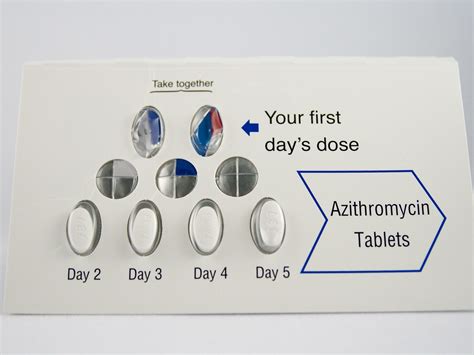What Is A Zpack? Your Antibiotic Solution

The term “Zpack” has become a common phrase in medical and pharmaceutical contexts, referring to a specific antibiotic treatment regimen. A Zpack is a predetermined pack of azithromycin, a broad-spectrum antibiotic, which is used to treat various bacterial infections. The name “Zpack” originates from the first letter of the antibiotic’s name, “Zithromax,” which is a brand name for azithromycin.
Azithromycin is a macrolide antibiotic that works by inhibiting protein synthesis in bacteria, ultimately leading to the death of the bacterial cells. This mechanism of action makes azithromycin effective against a wide range of bacterial infections, including respiratory tract infections, skin infections, and sexually transmitted diseases.
A standard Zpack typically consists of six tablets, each containing 250mg of azithromycin. The dosage regimen involves taking two tablets on the first day, followed by one tablet per day for the next four days. This treatment course is designed to provide a high initial dose of the antibiotic to quickly combat the infection, followed by a maintenance dose to ensure the infection is fully cleared.
Zpacks are often prescribed for various conditions, including:
- Acute bacterial sinusitis
- Community-acquired pneumonia
- Pharyngitis/tonsillitis
- Skin and soft tissue infections
- Genital ulcers
- Chlamydia
The advantages of a Zpack include its convenience, as the predetermined pack ensures that patients take the correct dosage and complete the full treatment course. Additionally, azithromycin has a relatively long half-life, which allows for once-daily dosing and improves patient compliance.
However, it is essential to note that antibiotics, including azithromycin, should only be used under the guidance of a healthcare professional. Overuse or misuse of antibiotics can lead to the development of antibiotic-resistant bacteria, making infections more challenging to treat.
In conclusion, a Zpack is a convenient and effective antibiotic treatment regimen for various bacterial infections. Its broad-spectrum activity, combined with its ease of use, makes it a popular choice among healthcare professionals. Nevertheless, it is crucial to use antibiotics responsibly and only under medical supervision to ensure their continued efficacy and minimize the risk of antibiotic resistance.
| Day | Dosage |
|---|---|
| 1 | 2 tablets (500mg) |
| 2-5 | 1 tablet (250mg) per day |

Antibiotics, including azithromycin, are only effective against bacterial infections. They will not work for viral infections, such as the common cold or flu.
Precautions and Interactions

While azithromycin is generally well-tolerated, there are potential precautions and interactions to be aware of:
- Allergic reactions: Individuals with a known allergy to azithromycin or other macrolide antibiotics should not take a Zpack.
- Drug interactions: Azithromycin can interact with certain medications, such as warfarin, and decrease their effectiveness.
- Pregnancy and breastfeeding: Azithromycin is generally considered safe during pregnancy and breastfeeding; however, it is essential to consult a healthcare professional before taking any medication.
To ensure safe and effective use of a Zpack:
- Consult a healthcare professional to determine if a Zpack is suitable for your condition.
- Read and follow the medication label instructions carefully.
- Complete the full treatment course, even if symptoms improve before finishing the medication.
- Be aware of potential interactions with other medications and inform your healthcare professional about any concerns.
In summary, a Zpack is a convenient and effective antibiotic treatment regimen for various bacterial infections. By understanding its uses, dosage, and potential precautions, individuals can make informed decisions about their treatment and ensure the responsible use of antibiotics.
What is a Zpack used for?
+A Zpack is used to treat various bacterial infections, including respiratory tract infections, skin infections, and sexually transmitted diseases.
How do I take a Zpack?
+A standard Zpack involves taking two tablets on the first day, followed by one tablet per day for the next four days.
Can I take a Zpack if I have a viral infection?
+No, antibiotics, including azithromycin, are only effective against bacterial infections. They will not work for viral infections, such as the common cold or flu.



